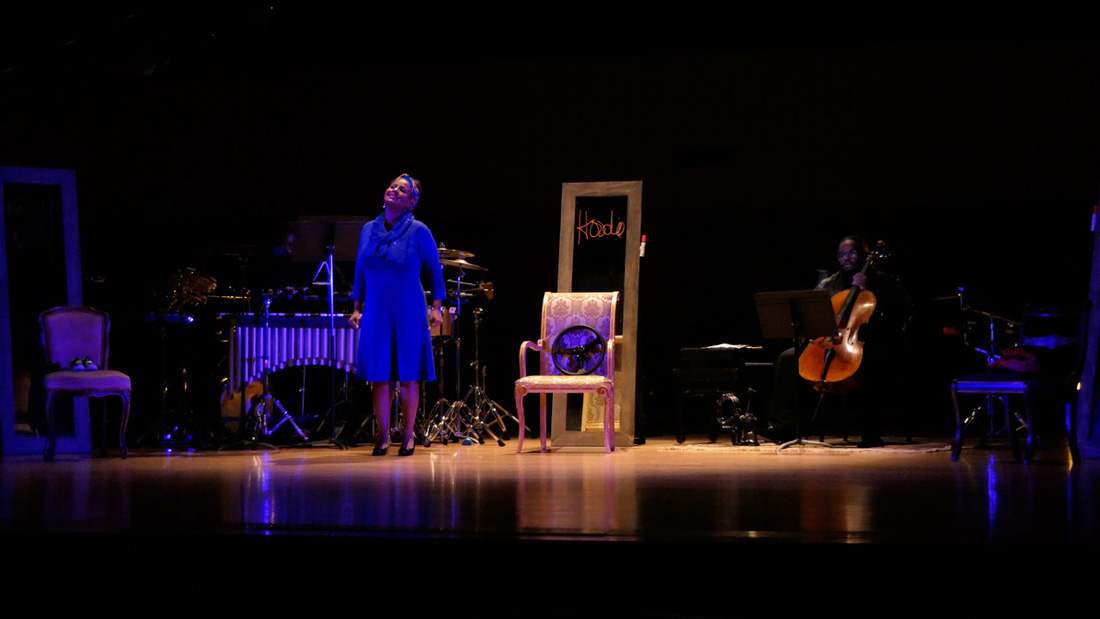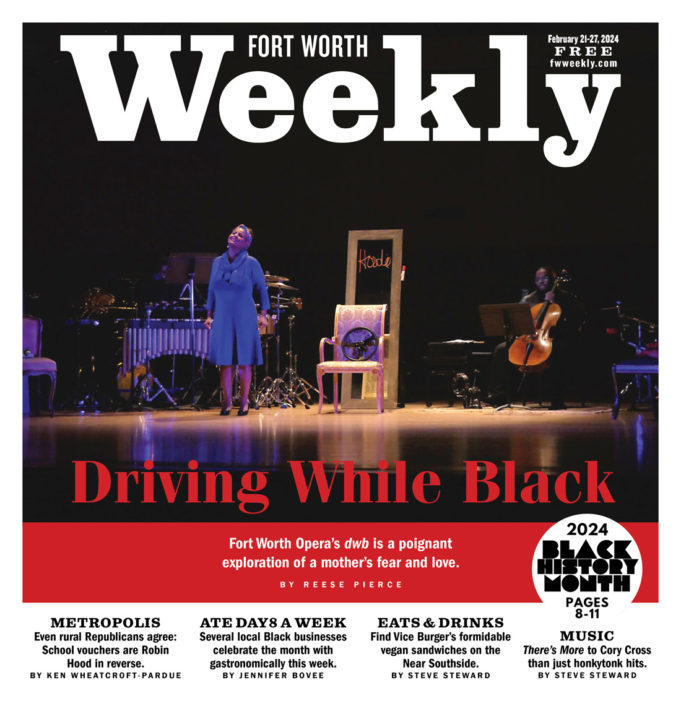The automobile has been an iconic symbol of freedom, accomplishment, wealth, comfort, and status in America since the late 19th century. Though slow-moving like most new technologies, car ownership was commonplace by the first quarter of the 20th century, but this guarantee of mobility, like the promise of freedom, wasn’t equitable for everyone. This vision of a new future was stalled for the disenfranchised Black population, and this historic American emblem didn’t mean the same thing across class and racial boundaries. For evidence, look no further than the 1936 publication of The Negro Motorist Green Book, a guide to safe travel for Black Americans.
From a metaphor for freedom to an anxiety of the open road, this duality of experience lies at the heart of dwb (Driving While Black), a one-act opera starring Soprano Marsha Thompson (Mother), Cremaine Booker (Cellist), and David Verin (Percussionist) with music by Susan Kander and libretto by Roberta Gumbel. First debuting in Kansas in 2019, this moving piece hampered by the lockdown is finding new life as it makes its regional debut thanks to the Fort Worth Opera. Set in the present day, the story focuses on the existential crisis of a Black mother as her son approaches age 16. Facing the effects of racism and the history behind the policing of Black bodies in the United States, Mother delivers a montage of vignettes following the developmental stages of her son from birth to driving age.
At TCU’s Van Cliburn Concert Hall, Director Ayvaunn Penn offered the perfect backdrop for Mother’s dread. The stage, though minimally appointed, subtly displayed the ensuing narrative journey. A series of six full body-length mirrors with accompanying chairs faced the audience in a semicircle. Below each lay a pair of shoes that evolved in size as the semicircle moved from stage right to left, suggesting the progression of age from newborn to young man. This sparse staging fully focused attention on Thompson as she freely moved through the vignettes with a fluidity that verged on stream of consciousness at times. It was in this space that Mother explored both her fears and her joys. She moved from chair to chair in each stage of her son’s life as her fears and apprehension grew.
The cast, like the set, is minimal. The music provided by cellist and sometimes actor Booker and percussionist Verin played a large role in defining the emotions of the piece. At times frantic and dissonant while at other times slow and melancholy, the music worked in lockstep with Thompson to evoke Mother’s internal conflict. The soprano effortlessly commanded the stage as she vacillated between sorrow and amusement in her multitude of roles, playing not only the woman at the center of the drama but also different voices (both male and female) announcing headlines that thematically linked her worries to real-world events.
In one scene, she voiced a young man, new to town, who became a victim of mistaken identity. He overheard the police who were “deaf to [his] utterances of innocence” as they deliberated whether to take him “down to the creek where no one can hear.” Detained, loaded into a paddy wagon, and released in an unfamiliar neighborhood, he eventually arrived home, shaken and terrified. Booker’s foreboding pizzicato punctuated this scene as the young man’s emotions crescendoed until he was told he was just “in the wrong place at the wrong time.”
If you’re thinking this might be more akin to a one-act musical, make no mistake. This is a full-on opera, and it doesn’t veer from the traditional format other than eschewing the Italian ladies in large wigs for a relevant dive into a Black mother’s hopes and fears in contemporary society. The production is fully committed to the genre, but the added layer of racial tension brings the story into a timely light.
At heart, dwb is still a tragedy. Social injustice drives the production’s emotional heft with the repeated refrain: “You are not who they see,” a constant reminder to her son that his race precedes him as he enters the world. Mother also evokes Martin Luther King Jr.’s famous speech and the reminder of unfulfilled dreams and promise as she wonders, “How can I set you on a path in this world that doesn’t live up to its promises or dreams?”
Equally heartbreaking and enlightening, dwb drills down on a crisis that plagues far too many parents.
dwb (Driving While Black)
Sat at the Kimbell Art Museum, 3333 Camp Bowie Blvd, FW. $55. FWOpera.org.

Photo by Freddie Watkins












